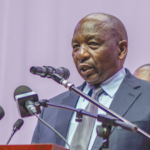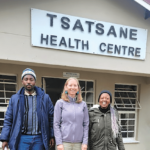… Requires M1.2 billion for relief
Ntsoaki Motaung
Lesotho is grappling with an alarming food insecurity crisis, requiring an urgent M1.2 billion to address the growing needs of its population, disclosed Reatile Elias, the Chief Executive Officer (CEO) for the Disaster Management Authority (DMA).
This critical need was revealed during the closing ceremony of the Africa CDC’s African Volunteer Health Corps initiative, Strengthening and Utilising Response Groups for Emergencies (AVoHC-SURGE) training in Leribe on Sunday.
Elias painted a grim picture of the country’s food security situation, indicating that the results of the latest annual vulnerability assessment report, soon to be presented to the Cabinet, were dire.
He disclosed that the number of people who would be in a food insecurity crisis had gone up significantly. By October this year, he said, close to 700,000 people across the country would be in a food insecurity crisis.
“There are five most affected districts with severity of food shortage including Mafeteng, Mohale’s Hoek, Quthing, Qacha’s Nek, and Maseru and they are on a crisis stage,” he said.
Elias noted that the worsening food insecurity could have direct implications for Lesotho’s health system.
The resources needed to combat this crisis have surged dramatically. “Last year, the required resources to address food insecurity were around M300 to M500 million, but this year we need at least M1.2 billion,” Elias said.
The annual Vulnerability Assessment Report is produced by the Lesotho Vulnerability Assessment Committee (LVAC), a multi-agency committee that consists of government ministries, NGOs, and UN agencies.
LVAC is chaired by the Deputy Chief Executive Officer of the DMA, while the secretariat is made up of DMA staff.
The technical core team led by DMA is made of the Ministry of Agriculture and Food Security, Department of Crops, Department of Nutrition, Food and Nutrition Coordinating Office (FNCO), Bureau of Statistics (BOS), World Vision, Lesotho Red Cross Society, Food and Agriculture Organisation (FAO) and the World Food Programme (WFP).
According to the latest Integrated Food Security Phase Classification (IPC) Acute Food Insecurity analysis, from July to September 2023, approximately 245,000 people in rural Lesotho (16 percent of the analysed population) were experiencing high levels of acute food insecurity (IPC Phase 3 or above – Crisis or worse).
The findings highlighted an urgent need for action to reduce food gaps, protect and restore livelihoods, and prevent acute malnutrition.
During this period, out of the 10 districts analysed in Lesotho, five were classified as IPC Phase Two (Stressed), while the remaining five were in IPC Phase 3 (Crisis).
Additionally, in December 2022, excessive rains resulting in waterlogging destroyed crops in many parts of the country, exacerbating the food insecurity situation.
In response to the food insecurity crisis, several interventions and appeals have been launched.
On May 20, this year, the extraordinary summit of the heads of state and government of the Southern African Development Community (SADC) on El Niño Induced Drought and Floods, was held virtually.
Prime Minister Ntsokoane Samuel Matekane attended the summit.
The summit received an update on the recent climate and weather situation in the region, and their impacts on its socio-economic development including their effect on basic commodity prices.
It urged member states to continue to monitor the situation and provide an enabling environment for agricultural stakeholders including farmers with surplus grain and vegetables to facilitate access to those in need.
Further, the summit noted the multifaceted and cascading impact of the El Niño induced drought and floods across multiple sectors, including agriculture and livelihood security, food security, nutrition, health, water, and energy, and called for coordinated, integrated, and harmonised interventions to address the adverse impact of El Niño.
“Summit received a report on the impact of disasters in the region and expressed concern over the humanitarian situation brought about by El Niño-induced drought and floods, which has affected over 61 million people,” read the summit communique.
It added: “Summit launched the SADC Regional Humanitarian Appeal of at least US$5.5 billion, aimed at augmenting domestic resources of the affected Member States, including efforts for resource mobilisation from national, regional, and international partners in response to the impacts of El Niño induced drought and floods.”
In April, the Advocates for the Supremacy of the Constitution, popularly known as SECTION 2, a legally registered NGO in Lesotho dedicated to advocating for the marginalised and the impoverished masses wrote an open letter to Matekane requesting him to consider the implementation of a food subsidy program for Basotho, “in response to the exorbitantly high prices that a significant portion of our population cannot afford”.
SECTION 2 stated that according to the World Food Program (WFP)’s Lesotho Annual Country Report 2023, published on 2 April 2024, Lesotho remains one of the most unequal countries globally.
“Nearly half of our population (49.7 percent) lives below the food poverty line, with a stark rural-urban divide in poverty distribution, affecting over 80 percent of the poor residing in rural areas,” it said.
“Of particular concern are our children, as highlighted in the same report, where 65 percent are classified as multi-dimensionally poor, and over a quarter are orphans,” it added.
The group further told Matekane that Lesotho faces the adverse effects of climate change, leading to increased frequency of extreme weather events such as droughts, soil erosion, and reduced soil fertility, significantly impacting livelihoods, incomes, food security, and the country’s agriculture-based economy.
It explained that food insecurity persists as a significant challenge, disproportionately affecting vulnerable groups such as children, women, individuals living with HIV/AIDS, persons with disabilities, unemployed youth, and rural dwellers, as emphasised by the WFP.
“We firmly believe that implementing a food subsidy program would offer much-needed relief to the hundreds of thousands of Basotho grappling with poverty, albeit belatedly,” SECTION 2 said.
“Despite the monumental challenges facing our national finances, providing affordable food to the impoverished masses would be a profound and welcomed relief, regardless of potential impacts on other sectors,” it added.
In a bid to provide immediate relief, the European Union (EU) earlier this month announced a contribution of €200,000 (approximately LSL 4,030,000) in humanitarian funding to support the most vulnerable and affected families in Lesotho, which have been severely impacted by El Niño-related drought and parched crop fields.
EU said this funding would be used by the Lesotho Red Cross Society to deliver critical assistance to over 2,500 families across four of the hardest-hit districts: Maseru, Mohale’s Hoek, Qacha’s Nek, and Quthing.
The assistance includes cash grants to 2,500 vulnerable families to alleviate the impact of soaring food prices, agricultural inputs and seeds, such as maize and beans, for planting in the summer, and training for community-based farmer groups on food preservation and climate-smart agriculture.
It also includes the rehabilitation and/or construction of water facilities within affected communities and an awareness campaign to educate communities on water treatment techniques and effective water management practices.
“This funding is part of the EU’s overall contribution to the Disaster Response Emergency Fund (DREF) of the International Federation of the Red Cross and Red Crescent Societies (IFRC),” the EU said.
“The EU’s support aims to alleviate the suffering of those affected by the severe drought and promote resilience in the face of climate-related disasters,” it concluded.
Summary
- The technical core team led by DMA is made of the Ministry of Agriculture and Food Security, Department of Crops, Department of Nutrition, Food and Nutrition Coordinating Office (FNCO), Bureau of Statistics (BOS), World Vision, Lesotho Red Cross Society, Food and Agriculture Organisation (FAO) and the World Food Programme (WFP).
- Further, the summit noted the multifaceted and cascading impact of the El Niño induced drought and floods across multiple sectors, including agriculture and livelihood security, food security, nutrition, health, water, and energy, and called for coordinated, integrated, and harmonised interventions to address the adverse impact of El Niño.
- “Summit received a report on the impact of disasters in the region and expressed concern over the humanitarian situation brought about by El Niño-induced drought and floods, which has affected over 61 million people,” read the summit communique.

Your Trusted Source for News and Insights in Lesotho!
At Newsday Media, we are passionate about delivering accurate, timely, and engaging news and multimedia content to our diverse audience. Founded with the vision of revolutionizing the media landscape in Lesotho, we have grown into a leading hybrid media company that blends traditional journalism with innovative digital platforms.









